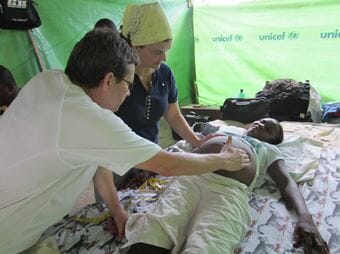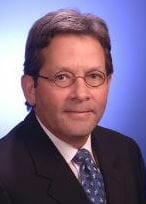Michael Bourque

Seven years ago on a medical mission to the Dominican Republic, Michael Bourque experienced his first loss of a healthy, young mother in his 30 years as an obstetrician. The 24-year-old woman, Marianna, was struggling with a complicated labor, and Bourque and other American doctors performed a cesarean section.

patient in Haiti.
After the baby was born, Marianna appeared fine. The doctors left her with local nurses for the night. But the nurses weren’t trained to recognize post-operative complications. Marianna suffered a stroke and died.
“It was an inconceivable thought in my mind that I could leave someone in perfect condition, but she died of a stroke because the nursing staff didn’t really know nursing; there was no blood testing, no one was called and there were no medical records,” Bourque recalls. “It was my introduction to third-world health conditions.”
He says he made Marianna a promise to try save other young women from what happened to her.
In 2006, Bourque and colleagues formed International Medical Missions of Saint Francis Hospital and Medical Center in Hartford, Conn. The program is composed of two surgical teams; Bourque leads the Blue Team and fellow doctor Abe Daoud heads the Red Team. All of the missionaries are volunteers.

Bourque’s team has led more than a dozen medical missions and delivered care for more than 2,600 people. It’s now focusing on the small fishing village of Dame Marie, located on the southwestern tip of Haiti. One of every 36 women there die during their childbearing years because of childbirth-related complications. The Blue Team has been delivering medical, surgical and dental care in Dame Marie since the earthquake in Haiti in 2011.
The team works closely with Haitian hospital staff to develop their medical skills. Haitian and American doctors share supplies and work collaboratively. The team’s approach differs from more quick and immediate aid, such as handing out supplies, clothes or food.
“By simply giving free supplies you create a dependent system and harm self-worth,” says Bourque. “You find that you really want to partner with a community and teach them how to do what you do, because ultimately they are the ones who will be there in the long term.”
Bourque plans to go back to Dame Marie four times this year, bringing a separate team each time, some from other hospitals. The hope is to have programs like International Medical Missions in other hospitals around the country. Bourque’s team also plans to build a mission house in Dame Marie, pay for American nurses to work there and create a scholarship fund for people who want to help. (Every missionary pays his or her own way, about $1,500 per trip.)
“We want to create a culture that is all about service of a global nature,” says Bourque. “When you actually get to know people in these unfortunate places, you see they are just like us and they want the same things. You understand all the blessings we have here in the U.S. and in my mind we have an obligation to help them as best we can.”
